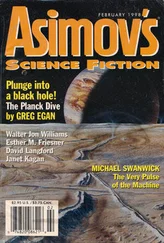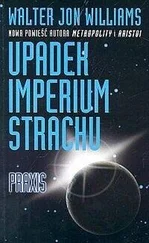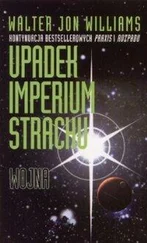Walter Williams - Deep State
Здесь есть возможность читать онлайн «Walter Williams - Deep State» весь текст электронной книги совершенно бесплатно (целиком полную версию без сокращений). В некоторых случаях можно слушать аудио, скачать через торрент в формате fb2 и присутствует краткое содержание. Жанр: Киберпанк, на английском языке. Описание произведения, (предисловие) а так же отзывы посетителей доступны на портале библиотеки ЛибКат.
- Название:Deep State
- Автор:
- Жанр:
- Год:неизвестен
- ISBN:нет данных
- Рейтинг книги:5 / 5. Голосов: 1
-
Избранное:Добавить в избранное
- Отзывы:
-
Ваша оценка:
- 100
- 1
- 2
- 3
- 4
- 5
Deep State: краткое содержание, описание и аннотация
Предлагаем к чтению аннотацию, описание, краткое содержание или предисловие (зависит от того, что написал сам автор книги «Deep State»). Если вы не нашли необходимую информацию о книге — напишите в комментариях, мы постараемся отыскать её.
Deep State — читать онлайн бесплатно полную книгу (весь текст) целиком
Ниже представлен текст книги, разбитый по страницам. Система сохранения места последней прочитанной страницы, позволяет с удобством читать онлайн бесплатно книгу «Deep State», без необходимости каждый раз заново искать на чём Вы остановились. Поставьте закладку, и сможете в любой момент перейти на страницу, на которой закончили чтение.
Интервал:
Закладка:
“Gunaydin,” she ventured, not knowing if the Turkish greeting would translate or not.
Ulugbek kicked one leg over the front hump of his camel and dropped to the sand. He wore boots and a parka with a MontBell label. He approached Ismet’s camel, gave it a series of clucks and commands, and compelled it to kneel. Ismet dismounted awkwardly, staggered on the sand, and recovered.
Ulugbek approached Dagmar and gave her a warm, extended hug. “Hayirli tong!” he said cheerfully. He smelled pleasantly enough of strong tobacco. At a loss for what to do, she patted him on the back.
Ulugbek hugged her twice more, then set to work. The camels were already wearing leather harnesses-that’s what Dagmar had heard jingling-and Ulugbek hooked them to nylon towing straps, which he then attached to the Niva’s rear bumper. The camels farted and belched. Dagmar and Ismet watched, both shivering in the cold.
“We and the black hats are in a low-speed chase,” Dagmar said. “We’re moving at camel speed.”
“Camels can go pretty fast,” Ismet said. “I just found out.”
Ulugbek gestured for someone to get into the Niva. Dagmar did so and put the four-by-four into reverse. Ulugbek gave a yell and began hitting the camels with a stick. The animals lurched forward into the harnesses, Dagmar gunned the engine, and the Niva rocked back. Red sand flew from the wheels.
It didn’t work; the Niva was still hung on the sand. But Ulugbek had thought ahead and strapped a shovel to his saddle. More sand flew as he dug sand from beneath the Niva, and then the camels were driven forward again.
Still the Niva didn’t move. Ulugbek was indomitable: he shifted more sand, then geed up the camels a third time. The Niva lurched backward, then hung. Ulugbek applied himself to the shovel, and more sand flew.
The eastern horizon was turning pale before the Niva finally came free. Ulugbek unhooked the tow straps, then came to Dagmar’s door. Dagmar opened the door, and Ulugbek stepped forward and embraced her.
More hugs were in order, apparently. Dagmar submitted with a good grace despite the fact that Ulugbek’s efforts at digging had left him covered in sand and sweat. Ismet tipped Ulugbek a can of caviar and then waved farewell as Dagmar gunned the engine and sped in the direction of Chechak.
Ismet sagged in his seat. “My god,” he said. “I never want to ride a camel again.”
“Was it painful?”
“It was too far above the ground,” Ismet said. “I was afraid I’d fall off and break an arm.”
When the rising sun at last blazed above the horizon, it showed a dark blotch on the watermelon red sands, a black oasis lying under chalky sandstone mesa. A cluster of receiver dishes and a cell phone tower stood atop the bluff.
“We’re there,” Dagmar said.
Ismet looked at the new world and yawned.
“Should I open a can of caviar?”
“That might be a little premature. Have a pear.”
The oasis grew closer. Houses of mud brick lined roads of sand. There was a general store with gas pumps out front, a coffeehouse, a tiny mosque with a metal dome that looked prefabricated, and several obese dogs lying in the early morning sunshine.
Dagmar slowed as she came into the town. Her GPS said that they had arrived. Wind blew the Niva’s rooster tail of dust over the car, and she peered through the ruddy dust. The town’s two commercial businesses both seemed closed. No one was yet on the streets.
In the sudden silence, she heard a tinkling waterfall sound. She wondered if it was wind chimes or perhaps a fountain.
She tried to phone Uruisamoglu for directions, but the cell network was down.
“God damn it!” she said.
“Go to the mosque,” Ismet said.
As she drove to the mosque she discovered the source of the tinkling sound: goats’ bells, each tuned to a different note. The herd passed in front of her, urged on by an elderly man in felt boots and an olive green Russian army anorak trimmed with rabbit fur.
More elderly men were found at the mosque, where the dawn service had just ended. They stood in their white skullcaps, carrying their beads and talking with one another. Ismet got out of the Niva, approached, and had a lengthy conversation. He got back in the Niva and gestured toward the bluffs.
“Slash is only in the most obvious place for an IT guy,” he said.
Dagmar looked up at the antenna that reared above the town.
“Right,” she said, and put the Niva in gear.
“How is your Uzbek, by the way?” she asked.
“Nonexistent,” Ismet said. “Uzbek is about as close to modern Turkish as German is to English.”
“You managed to talk to them, though. And Ulugbek.”
“We found a few words in common.”
“Whoah!” They had come to the edge of town, and Dagmar braked at the prow of a strange duck-billed vehicle looming around the corner of a mud wall. The other machine didn’t move, and Dagmar realized it was just parked there.
She slowly pulled ahead and saw that she had been startled by a battered old armored vehicle with eight huge tires, its steel flanks studded with little portholes. The original olive drab paint had flaked off it, and it was now spattered with rust, like an old boulder that had been scabbed with fungus.
“Lots of old Soviet military gear lying around the provinces,” Ismet said.
“There are license plates on it,” she said. “Someone must drive the thing.”
The armored vehicle was set up to pull what looked like a long homemade trailer, with a lot of old pipe stacked on it.
“Maybe the owner digs wells,” Ismet said.
The Niva descended into a gulch behind the town, then climbed up the other side. Ahead Dagmar saw a two-rut road running past the face of the bluffs, weaving between boulders that had been eroded from above and tumbled down the slope. They came around one craggy rock and saw that a new road had been blazed up the face of the bluffs. She shifted the vehicle into four-wheel drive, cranked the wheel over, and the Niva began to lurch upward.
As they came around a curve they had a view of the oasis and the desert below.
“Look there,” Ismet said.
Dagmar braked and saw a red rooster tail crossing the desert, moving fast in their direction.
“That would be our friends from the airport,” Ismet said. “I don’t think Babur was able to hold them for very long.”
“They’ve got a lot faster car than we do,” Dagmar said. She looked at him. “What do we do now? We’re stuck on this hill.”
“Go up to the top,” Ismet said. “We can’t turn around here.”
The Niva jounced to the top of the road. The tower and the receiver dishes were surrounded by chain link and razor wire. But beyond the tower, to Dagmar’s surprise, she saw a yurt, the round felt-walled dwelling that had been a home to the steppe peoples for millennia. Ismet’s nomad relatives still lived in similar tents, at least part of the year.
Next to the yurt sat a Volkswagen Rabbit that seemed about the same vintage as the armored vehicle she’d seen in the oasis.
“I’ll drive,” Ismet said. He jumped out of the passenger door, then paused to look down as the strange car entered the village. “Take your gun.”
Heart pounding, Dagmar reached for the gun and its holster and jammed the holster into the back of her jeans.
“What are you doing?”
He turned to look at her. Bruises bled down his face.
“I’m going to lead them off into the desert,” he said. “Once we’re away, you get Slash into his car”-jerking his head toward the Rabbit-“and then you get him to Zarafshan.”
Ismet jumped into the Niva, and there was a shriek of gears as he put it in reverse. As he backed, then turned and began rocking down the bluff, Dagmar was aware that a young man had come out of the yurt and was watching her.
Читать дальшеИнтервал:
Закладка:
Похожие книги на «Deep State»
Представляем Вашему вниманию похожие книги на «Deep State» списком для выбора. Мы отобрали схожую по названию и смыслу литературу в надежде предоставить читателям больше вариантов отыскать новые, интересные, ещё непрочитанные произведения.
Обсуждение, отзывы о книге «Deep State» и просто собственные мнения читателей. Оставьте ваши комментарии, напишите, что Вы думаете о произведении, его смысле или главных героях. Укажите что конкретно понравилось, а что нет, и почему Вы так считаете.











